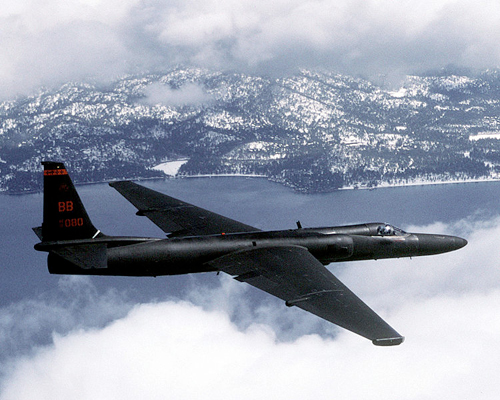A great example of Eisenhower and Khrushchev's style of confrontation came in 1955, soon after Khrushchev had solidified his position as the new Soviet leader.
On July 21, 1955, Eisenhower met with the leaders of Britain, France, and the Soviet Union. In addition to the expected topics for discussion, Eisenhower had a surprise: a proposal called "Open Skies."
 |
| America's spy planes secretly collected information that Eisenhower's Open Skies proposal would have made open and public. |
The Open Skies proposal was simple--all four countries would provide maps of their military installations and allow the other three to conduct surveillance on those installations from the air. The goal was to ensure that all countries were keeping their word when it came to arms agreements.
Khrushchev was strongly against this idea. He called it an "espionage plot" and insisted that the Soviet Union's borders would remain closed to the West. At that point in time, the Soviet Union was far behind the United States in military technology and capability, and he didn't want to expose that fact to the world.
But Eisenhower already knew that Khrushchev would reject the Open Skies proposal. His plan wasn't to spy on the Soviet Union but to make Soviet leaders seem like bad guys who wouldn't cooperate.
This was typical of Soviet-American interaction when Eisenhower and Khrushchev were leaders. They were still opponents, but they weren't as directly confrontational as Truman and Stalin had been, and they played more diplomatic games.
Think about U.S.-Soviet relations under the different leaders we've covered in today's lesson and then answer the question below.
How were Eisenhower-Khrushchev relations different from Truman-Stalin relations?
What was the Open Skies proposal?
How did the Soviet Union respond to the Open Skies proposal?
| Your Responses | Sample Answers |
|---|---|
| Eisenhower was just as committed to containment as Truman, and Khrushchev was just as committed to expanding communism's influence as Stalin, but they didn't engage in military showdowns. Eisenhower preferred to work out problems with diplomacy. | |
| The Open Skies proposal was Eisenhower's plan for Britain, France, the United States, and the Soviet Union to reveal the locations of their military bases to each other and allow aerial surveillance of them. | |
| Khrushchev rejected the proposal immediately. He didn't want other countries spying on the USSR. |
